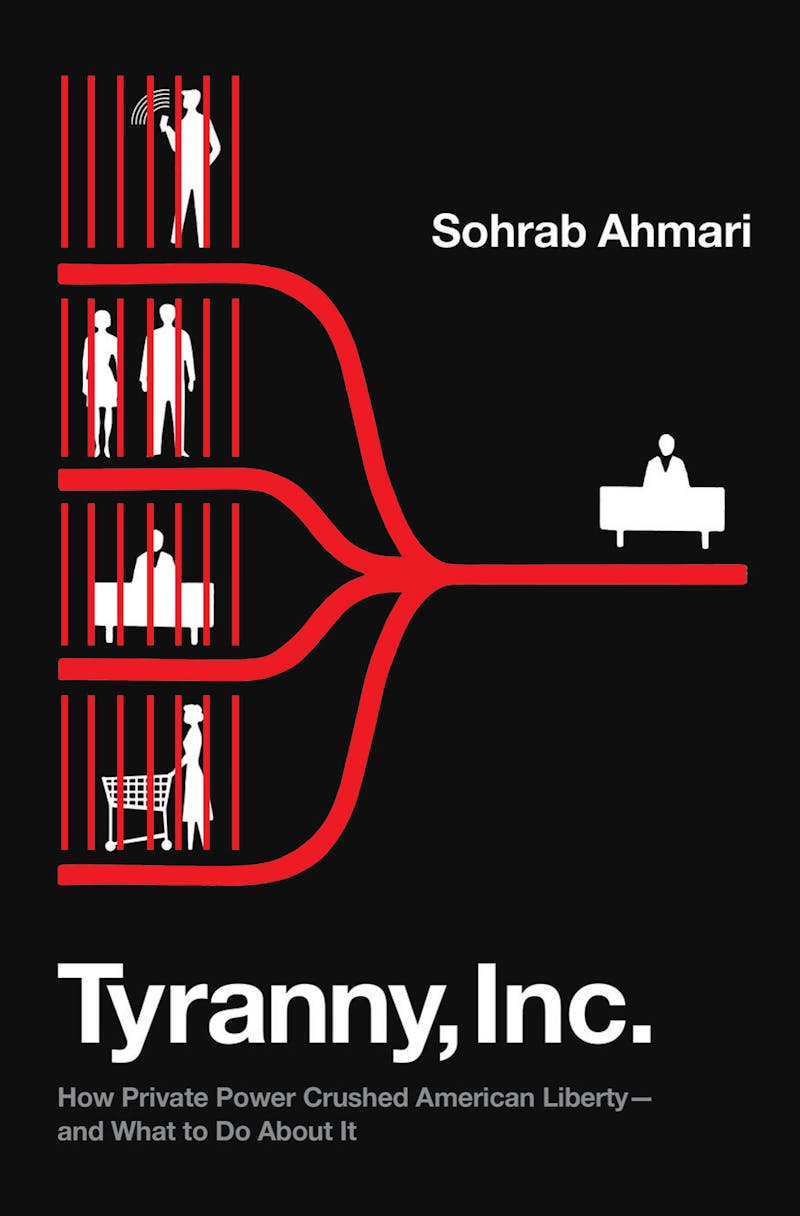“A relatively narrow elite lords over a class hierarchy whose obscene disparities would have left the plutocrats of the Gilded Age blushing,” Sohrab Ahmari declares in his vigorous jeremiad Tyranny, Inc. Dismantling the reigning neoliberal order, he contends, would require “a labor market in which most sectors are unionized” and a higher minimum wage for all workers, giving labor the “security needed to mount countervailing power in the absence of labor organization.”
Such statements would be unremarkable if a leftist or a liberal Democrat had written them. Members of the Progressive Caucus in Congress routinely make sharp critiques of corporate power, while socialists agree that a historic surge in union numbers and power would be essential to launching any serious attack on economic inequality. As one can guess from its title, The Corporate Sabotage of America’s Future, a new book by Robert Weissman and Joan Claybrook—the present and past heads of the venerable consumer advocacy group Public Citizen—indicts similar culprits and offers similar solutions.

But for most of the past decade, the 38-year-old author of Tyranny, Inc. has been a prominent voice on the journalistic wing of the American right. Ahmari wrote and edited opinion pieces for The Wall Street Journal; contributed frequently to Commentary and First Things, a prominent magazine on the Christian right; and served the Murdoch empire again as op-ed editor of the New York Post. In 2019, the Iranian-born convert to Roman Catholicism co-drafted a “manifesto of sorts,” published in First Things. It rebuked any conservative willing to negotiate about “the dignity of every unborn life” or who “bowed to a poisonous and censorious multiculturalism.” Ahmari has made the case that Donald Trump is the conservative movement’s best hope. While acknowledging that he “sometimes failed to translate his rhetoric into reality,” Ahmari has argued that Trump “alone offers Americans a chance to confront and chasten their failed elites,” and expressed hopes that the several-times-indicted tyrant will carry the GOP standard in 2024. A prolific and provocative writer with close to 150,000 Twitter followers, Ahmari is one of the more influential figures on the populist right who has never held political office.
The dissonance between his traditionalist line on cultural issues and his progressive approach to political economy makes Ahmari’s new book a fascinating document in the intellectual evolution of the right since the days when neoconservatives like William Kristol and Dick Cheney defined its course. A primary objective of their movement—and of the Republican Party it came to dominate—was to cut taxes on the rich and roll back regulations on the firms some of them ran. But today’s GOP is most vocal about cultural issues and is even willing to fight large corporations over them. (Take, for example, Ron DeSantis’s battle with Disney and his campaign against environmental, social, and governance investments, or ESG.) Ahmari goes further, taking aim not just at “woke” capital but at a salient feature of modern capitalism itself: how “self-seeking private actors” benefit from a system of “structural, class-based domination” that makes Americans unfree in many aspects of their daily lives.
More than half the chapters in Tyranny, Inc. open with a contemporary horror story of business abuse, followed by an analysis of the nefarious legal and political forces that made it possible. After Alicia Fleming, a restaurant server from Massachusetts, had her first child, her employer refused to schedule her working hours more than a few days in advance. She struggled to find someone to care for the baby when she had to be on duty at the restaurant past midnight. For Ahmari, Fleming’s plight is a prime example of the psychological as well as economic plight of millions of wage earners who lack the protection of unions or the type of workplace regulations that a strong labor movement could get the state to enact. Not “until a year and a half later, well into a crucial development phase for her baby,” Ahmari reports, did Fleming land a job that enabled her to plan her life at work and home with any predictability.
Another chapter begins with the tale of the Purcells, a working-class couple from Surprise, Arizona, who got stuck with a bill of almost $20,000 from a private firefighting company after their trailer home burned down. The town, they later learned, had neglected to inform residents they had to buy an annual “fire subscription plan” from a firm called Rural/Metro if they wanted to avoid being hit with an exorbitant surprise on top of the misery the flames would bring.
The Purcells’ story gives Ahmari an opportunity to vilify the private equity firms that snapped up Rural/Metro and other fire and ambulance companies during and after the Great Recession. Like clever vultures, PE companies finance their purchases with debt and then dun unsuspecting customers to earn back their investment and more. “There is nothing inevitable,” Ahmari seethes, “about a family having to pay $20,000 for lousy private firefighting services they never asked for” or “about patients being deprived of urgent care because a thirtysomething Harvard MBA … loaded up the local ambulance service with unsustainable debt, causing vehicles to fall into disrepair and staff to be laid off.” A decent society would take care of people in extremis efficiently and cheaply, if not for free. Yet sadly, the United States has betrayed the common sense of the common good.
Ahmari’s indictment of corporate tyranny and its powerful enablers moves from outrage to outrage. He describes how nonunion employees get forced to take their grievances to arbitration, where their bosses have all the advantages, instead of being allowed to sue in open court. He reports how hedge funds bought up hundreds of local papers, slashing jobs and selling office buildings to make a killing. He lambastes huge corporations like Johnson & Johnson and Purdue Pharma for exploiting bankruptcy laws and finding sympathetic judges to severely limit the size of payments to Americans whose lives their products have ruined. Each chapter reads like a well-crafted, extended opinion piece: Short quotes from specialists back up the alarming claims, and vivid metaphorical chapter titles—“Gagged by the Contract,” “Parched for Truth,” “The Corporate Eroder”—drive his points home. Ahmari has compressed a wealth of investigative sleuthing done by others into a convincing portrait of a market economy that is “free” only for those who have the resources and connections to manipulate it to their advantage.
Ahmari is hardly the first American conservative to make a trenchant attack on the coercive powers of big business. In the 1930s, Southern Agrarian intellectuals like John Crowe Ransom defended a romanticized—and racist—notion of old Dixie against “a system which allows a relatively few men to control most of the nation’s wealth and to regiment virtually the whole population under their anonymous holding companies and corporations.” In the 1990s, paleo-conservatives like Patrick Buchanan and Sam Francis launched fusillades against global corporations that moved good American manufacturing jobs abroad and had “no loyalty to workers and no allegiance to any nation.” When Trump vowed to end “American carnage” in his 2017 inaugural address, he was snarling much the same tune.
Since the late nineteenth century, several leaders of Ahmari’s own church have called for robust limits on the freedom of employers and financiers to run the economy for their own benefit. “Some opportune remedy must be found quickly,” wrote Pope Leo XIII in an 1891 encyclical, “for the misery and wretchedness pressing so unjustly on the majority of the working class.” He called on Catholic wage earners to form unions and for governments to raise the living standards of the poor. Forty years later, Pope Pius XI blasted the “immense power and despotic economic dictatorship” of “a few,” including those who “control credit … and rule the lending of money.” Ahmari is well aware of this tradition. At one point, he remarks how close Pope Leo’s views about the “masters of industry” were to those of Marx and Engels in The Communist Manifesto.
Of course, Ahmari’s favored alternative to capitalist tyranny is not the radical break that Marx and his socialist disciples espoused. He has a more moderate and homegrown example in mind: the New Deal. He praises FDR’s program for its ability “to defang—or at least … soften the bite of—coercion in the marketplace” and for helping organized labor become a countervailing power to big business in the workplace. Ahmari recognizes that the order liberals built during the 1930s and that endured for several decades fell short of achieving the kind of social democracy that flourished in Western and Northern Europe and that remains mostly intact in places like Denmark and Finland today. He prefers the ungainly term “political-exchange capitalism” to describe the “political give-and-take in relations between the asset rich and the asset-less.” But in its essential aspects, social democracy is the name of his desire. Reviving it in this century would, he might say, make America great again.
Can liberals seek an alliance of mutual convenience with this self-described “pro-life New Dealer”? Should they even try to create what Ahmari calls a “left-right consensus in favor of tackling the coercion inherent to markets”? He has made a sustained effort to reach across the intellectual chasm to pro-union, anti-corporate activists and thinkers on the left. Last year, Ahmari attended the biennial conference of Labor Notes, a gathering of grassroots union organizers and enthusiasts where conservatives are usually as common as anarchists in Congress. He predictably made fun of the “pronoun stickers” and the “genuflection at the altar of racialized politics” he witnessed there. But Ahmari advised his “right-wing confrères” to embrace the cause of union growth anyway. The wages of 90 percent of working Americans, he points out, “have remained stagnant for about 30 years.” Therefore, “as the labor movement seeks to democratize our economy, and to enhance the power of workers … it remains a profoundly decent, humane force.”
That article appeared in Compact, the online magazine Ahmari co-founded in the spring of 2022, which hosts a sometimes bewildering but well-curated mélange of voices from both left and right. On any given day, the site might feature a piece by a Marxist like Vivek Chibber, Slavoj Žižek, or Christian Parenti. On others, stalwart conservatives like the journalist Christopher Caldwell and the political theorist Patrick Deneen take the virtual floor. Whatever their differences, all these writers share an antagonism toward identity politics and what Ahmari deems “the left’s weird cultural tics”—from Drag Queen Story Hour to “the latest in gender ideology and Ibram X. Kendi Thought.” The best escape from the horrors of “wokeness,” they believe, would be a robust populism that champions the economic interests of working-class people.
At the end of Tyranny, Inc., Ahmari argues that both sets of ideologues should abandon some cherished initiatives that really just serve their corporate masters. “Lifestyle leftists” unwittingly aid big business by gaining “symbolic victories” over speech codes and executive diversity while their bosses undermine union drives and hold down wages. He scolds conservatives for hewing to “a downright ludicrous politics centered on preaching timeless virtues” that does nothing “to alter the fundamental balance of power between corporations and the rest of us.” Both groups should recognize that only a vigorous and sustained working-class movement can brush aside their misleading narratives and make America “the land of the free” once more.
Although Ahmari is no Marxist, such reasoning echoes the vulgar species of that venerable worldview. One cannot reduce political combat to a struggle over material power and interests. Tyranny, Inc. never seriously engages with the race, ethnicity, or immigrant status of any of the victims of business venality whose stories he tells. It would be wonderful if the 90 percent of American workers stuck at the same pay level bonded over their common plight. But a reliable analysis of why they have not done so must confront the primacy of those identities, divisive or otherwise: Neither now or in the past have most wage earners in our always multiracial, always unequal nation considered themselves to be members of a united working class, and the assumption that one can easily put those differences aside makes no more sense when it comes from the right than from the left. And it is no coincidence that, as Ahmari mentioned in his report on the Labor Notes conference, most of the young people leading the still quite modest revival of unionism also cheer on Black Lives Matter and defend the rights of lgbtq people. “Solidarity” is a more pluralist, multicultural commitment than it was back in the 1930s, when the dominant imagery and reality of organized labor were white and male.
Ahmari’s book also ignores the most urgent issue right and left battle over today—on which he elsewhere takes a fierce, uncompromising stand. No pregnant waitress or warehouse worker who wants an abortion would be persuaded to change her mind because a devout Roman Catholic man tells her she would be committing murder. And to denounce the coercive behavior of corporate bosses while smiling on that of politicians who outlaw the right to terminate a pregnancy requires a definition of “liberty” that a majority of Americans decisively reject by nearly a two-to-one margin.
In his book, Ahmari omits his hatred of abortion while making a strong case for a capitalism that would cheat working people less and give them more power to control their lives on the job and in the marketplace. But given his silence, he cannot explain why it is any more acceptable to force millions of those women and men to live by a theology with which they disagree than it is to compel them to shell out thousands of dollars for private fire insurance or to submit to binding arbitration. He also fails to mention that the same devout Catholic justices on the Supreme Court whom he derides for letting employers “get away with wage underpayment” also voted unanimously to overturn Roe v. Wade.
For Ahmari and his fellow Compact writers, there is no enemy more despicable than liberalism. Last year, the magazine’s co-editor Matthew Schmitz, another convert to Catholicism, paraphrased an old quip from Norman Mailer: “You can call me anything you want, just don’t call me a liberal.” It is libertarians on the right who uphold the freedom of capitalists to crush unions, and liberals on the left who think people should be free to marry someone of the same gender or change that gender at will. In his new book, Regime Change, promoted by Compact, Patrick Deneen deplores “the rise of a distinctive ruling class that today dominates the institutions of the West. Members of this ruling class are selected for their support and defense of the liberal order.” Only the overthrow of this “regime” that, according to Deneen, “has globally ravaged the working classes, leaving them simultaneously in a condition of economic precarity and social disintegration,” will do.
Liberals and leftists who muse about forming a united front with the right against the corporate elite might study how an earlier uneasy alliance worked out—between the Northern and Southern Democrats who enacted the signature legislation of the New Deal. Both party factions endorsed FDR and cheered his populist attacks on the “economic royalists” in the GOP who fought to preserve their largely unregulated wealth and power. While vowing to uphold Jim Crow forever, Dixie politicians also happily voted to create Social Security, fund public works jobs, subsidize crop prices, and bring electricity to farms and homes in their region, then the poorest in the nation. Co-sponsor of the act that established the Tennessee Valley Authority was Representative John E. Rankin from Mississippi—a vicious figure who also proposed a ban on interracial marriage and claimed a federal anti-lynching bill would “encourage Negroes to think they can rape our white women!”
It’s hard to see how contemporary populists, right and left, would find a way to work together to emulate that alliance. As steadfast cultural conservatives, Ahmari, Deneen, and their ilk are quite unlikely to support Democrats like Sherrod Brown and Alexandria Ocasio-Cortez, who share their economic views but feel just as strongly about protecting reproductive freedom and marriage equality. The progressive activists who routinely campaign for the latter would probably desert those politicians in a hurry if they welcomed a partnership with former and future backers of Trump. And although Josh Hawley and Marco Rubio blurbed Tyranny, Inc., neither they nor any other Republican senators support the PRO Act, which would remove some of the major legal barriers to organizing unions. Not a single GOP lawmaker voted to confirm Jared Bernstein, long one of the most prominent pro-labor scholars in the United States, to chair Biden’s Council of Economic Advisers.
So the prospect for a serious crackdown on private tyranny and a new surge of unionism will depend, as in earlier eras, on the emergence of mass movements that organize for those ends and consistent electoral triumphs by a party that favors them. It is good news that an increasing number of conservatives soundly reject the “free-market” gospel that was the bedrock of right-wing ideology and policy since the onset of the New Deal. But the kind of “regime change” that illiberal populists favor would leave ordinary Americans even more divided from one another than they are already. And it would embolden greater assaults on personal liberty rather than spawn a new birth of freedom from corporate rule.










